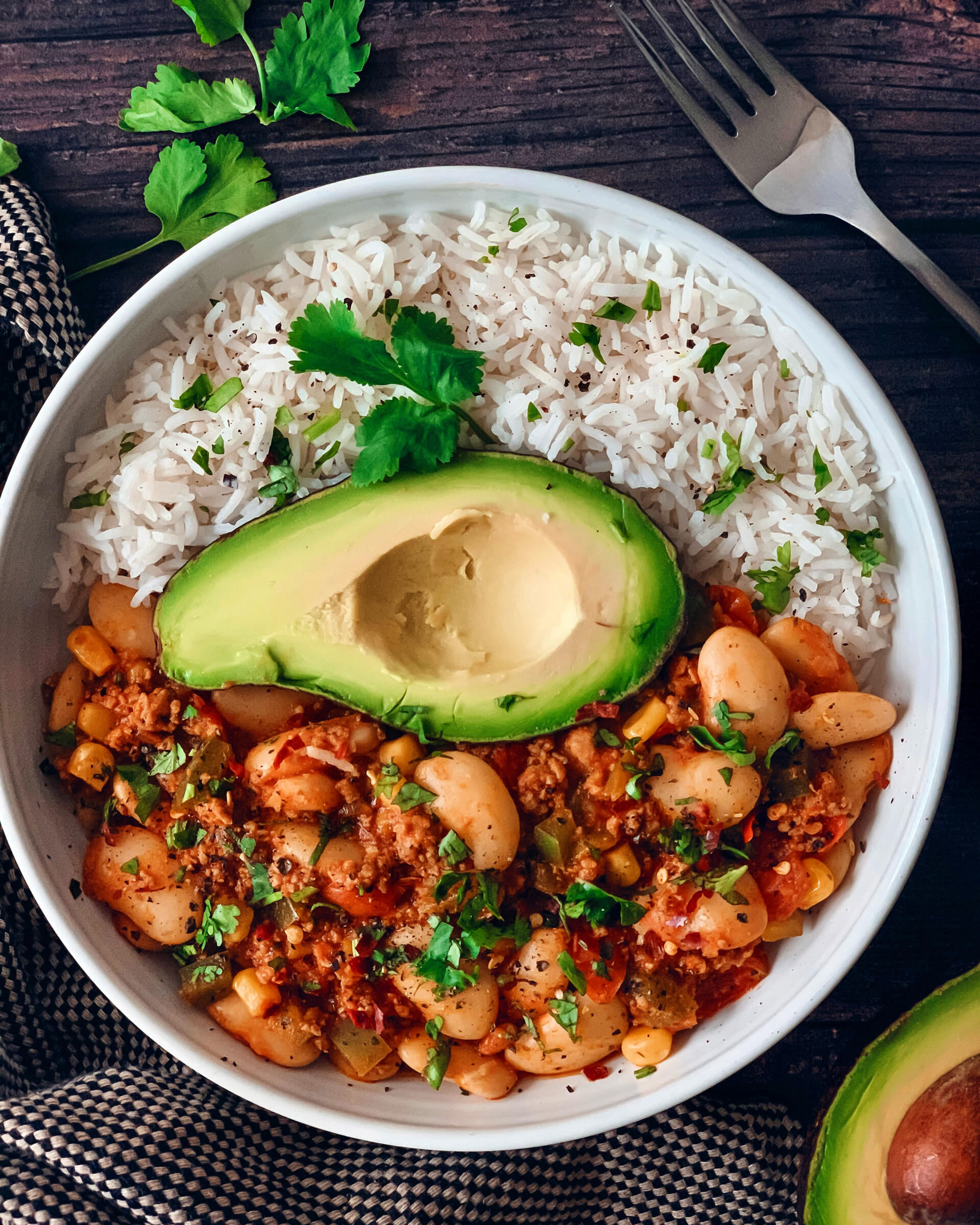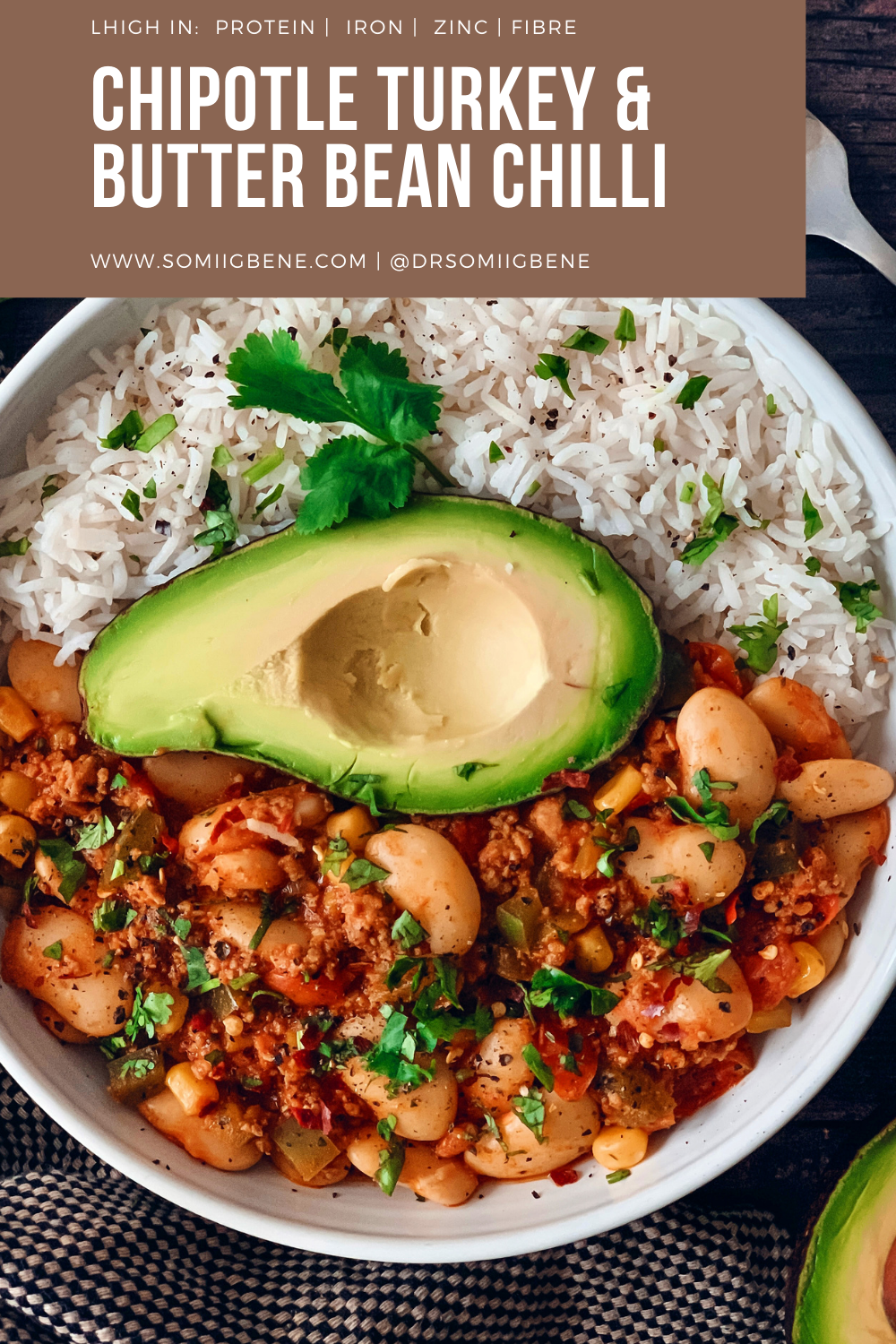
This chipotle turkey chilli is full of flavour and pairs well with basmati rice or bulgur wheat. Best of all, it is a delicious, low saturated-fat alternative to regular chilli con Carne.
Chilis, made with red meat and kidney beans, are one of those stews you can make big batches of at the weekend and enjoy during the week. You can serve them with rice, bulgur wheat, or jacket potatoes. And if you’re feeling adventurous, with toast.
Epidemiological studies associate red meat consumption with increased risks of chronic diseases such as type 2 diabetes, heart disease and cancer, mainly due to their high saturated fatty acid content.
However, an association does not mean causation. i.e., that red meat consumption is associated with chronic diseases does not mean that eating red meat causes type 2 diabetes, heart disease, cancer e.t.c.
Red meat is a source of essential amino acids, B vitamins, vitamin A (in offal cuts), zinc, selenium and iron. Red meats from organic, pasture-raised animals are also good sources of anti-inflammatory omega-3 fats.
And it is worth noting that at least 50% of the saturated fat in red meat exists as stearic acid. Stearic acid has a neutral effect on cardiovascular disease risk. Humans generally convert it to oleic acid – the primary monounsaturated fatty acid found in olive oil with several health benefits.

The bottom line is that red meat can be part of a healthy diet. To err on the side of caution, choose lean cuts and eat it in moderate quantities to lower your saturated fat intake.
That said, variety is essential for good nutrition. You can make a delicious chilli with other types of meat such as turkey.
Turkey (breast) is a low saturated fat alternative to red meat.
Turkey is another excellent source of quality protein that is low in saturated fat (skinless cuts). It is a good source of similar nutrients in red meat such as iron, copper, zinc, selenium and B vitamins including B12. And many epidemiological studies associate white meat with lower risks of metabolic disease.
To make this chilli, I have paired turkey with butter beans instead of red kidney beans. Butter beans have similar health benefits to red kidney beans being rich in fibre, iron, zinc, and folates.
An important reason for consuming plant foods with meat protein is that meat increases the bioavailability of nutrients found in plant foods when they’re eaten together.
Let’s get into this recipe!
Print
Chipotle Turkey and Butter Bean Chilli
- Prep Time: 5 minutes
- Cook Time: 30mins
- Total Time: 35 minutes
- Yield: Serves 1
- Category: Lunch/Dinner
- Cuisine: Mexican-inspired
Description
A delicious, low saturated-fat alternative to regular beef chilli.
Ingredients
- 100g ground turkey breast
- 50g butter beans, cooked
- 50g sweet corn
- 1 medium shallot, finely chopped
- 1 teaspoon olive oil
- 1 garlic clove, finely chopped
- 1 tablespoon tomato puree
- 1 teaspoon ground cumin
- 1 teaspoon smoked paprika
- 1 teaspoon chipotle paste
- 1 small vegetable stock cube
- Large handful coriander, stalks and leaves separated then chopped
- 80g cooked basmati rice, to serve
- ¼ avocado, sliced (optional)
Instructions
- Heat olive in a medium saucepan. Fry shallots until softened then add spices and turkey breast and garlic. Fry for a few minutes then add tomato puree, stock cube, chipotle paste, butter beans, corn, chopped coriander stalks and around 300ml of water. Bring to the boil then turn the heat down to a simmer and cook for 25 minutes.
- Take the pan off the heat. Stir in coriander leaves and season with salt and black pepper if needed.
- Serve chilli over steamed rice with avocado slices. Garnish with extra fresh coriander if needed.
Nutrition
- Serving Size: Serves 1
- Calories: 403
- Fat: 13.5g
- Saturated Fat: 2.6g
- Carbohydrates: 37g
- Fiber: 8g
- Protein: 33.6g
References:
- Al-Shaar, L., Satija, A., Wang, D.D., Rimm, E.B., Smith-Warner, S.A., Stampfer, M.J., Hu, F., B and Willett, W.C. (2020) Red meat intake and risk of coronary heart disease among US men: prospective cohort study. BMJ, 371.
- Wolk, A. (2017). Potential health hazards of eating red meat. Journal of Internal Medicine, 281, 106–122.
- De Castro Cardoso Pereira, P.M., and dos Reis Baltazar Vincente, A.F (2013) Meat nutritional composition and nutritive role in the human diet. Meat Science, 93, 586–592.
- Biesalski, H.K (2005) Meat as a component of a healthy diet – are there any risks or benefits if meat is avoided in the diet? Meat Science, 70(3), 509-524.
- Hunter, J.E., Zhang, J., & Kris-Etherton, P.M. (2010) Cardiovascular disease risk of dietary stearic acid compared with trans, other saturated, and unsaturated fatty acids: a systematic review. The American Journal of Clinical Nutrition, 91(1), 46-63.
- Da Silva Martins, T., de Lemos, M.V., Mueller, L.F., Baldi, F., de Amorim, T.R. Ferrinho, A.M., Munoz, J.A., et al. (2018) Fat deposition, fatty acid composition, and its relationship with meat quality and human health. DOI:10.5772/intechopen.77994.
- Praagman, J., Vissers, L.E.T., Mulligan, A.A., Khaw, K.T., Jakobsen, M.U., and Lujis, I. (2018) Consumption of individual saturated fatty acids and the risk of myocardial infarction in a UK and a Danish cohort. International Journal of Cardiology, 279, 18–26.
- Marangoni, F., Corsello, G., Cricelli, C., Ferrara, N., Ghiselli, A., Lucchin, L., and Poli, A. (2015) Role of poultry meat in a balanced diet aimed at maintaining health and wellbeing: an Italian consensus document. Food and Nutrition, 59, 27606.
- Hu, F.B., Stamper, M.J., Manson, J.E., Ascherio, A., Colditz, G.A., Speizer, F.E., et al. (1999) Dietary saturated fats and their food sources in relation to the risk of coronary heart disease in women. American Journal of Clinical Nutrition, 70, 1001–8.
- Kim, Y., and Je, Youjin (2018) Meat consumption and risk of metabolic syndrome: Results from the Korean population and a meta-analysis of observational studies. Nutrients, 10(4), 390.
- Becerra-Tomas, N., Babio, N., Martinez-Gonzalez, M.A, et al. (2016) Replacing red meat and processed red meat for white meat, fish, legumes or eggs is associated with lower risk of incidence of metabolic syndrome. Clinical Nutrition, 35(6), 1442–1449.
- Polak, R., Phillips, E.M., and Campbell, A. (2015) Legumes: Health benefits and culinary approaches to increase intake. Clinical diabetes, 33(4), 198–205.

